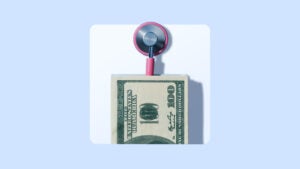Survey: Most Americans say personal finances haven’t improved under President Trump

Nearly three-quarters of Americans say their personal finances haven’t improved since President Donald Trump took office in January 2017, according to a new Bankrate survey. The harsh assessment — which comes on the heels of an economic boom during Trump’s first three years in office — can be blamed only partly on the coronavirus outbreak.
Indeed, most Americans say they’ve been unfazed by the recent recession, according to the Bankrate survey of more than 1,300 people conducted in early June. As for their assessment of Trump’s full tenure, just 17 percent of Americans say their personal finances are better now than when Trump moved into the White House.
An additional 45 percent say their situations have stayed about the same, while 29 percent are worse off now. The remaining 10 percent say they don’t know. Republicans have a more favorable view, with 24 percent saying their finances have improved during the Trump era, compared with 17 percent of independents and 13 percent of Democrats.
Key takeaways:
- Assessing Trump’s stewardship of the economy overall, 42 percent of Americans call it poor or very poor, while 35 percent say it has been good or very good.
- 53 percent of U.S. adults say their financial pictures are about the same since the COVID-19 outbreak, and 12 percent say their finances have improved during the pandemic.
- Asked whether Donald Trump or Joe Biden would be better for their personal finances, respondents narrowly favor Trump.
Perceptions vary by income, gender, age
The economy was the hallmark of Trump’s first three years in office. Until February, Trump touted record-low unemployment and record-high stock prices as a reflection of his stewardship of the economy. Then the coronavirus pandemic struck in March, sending the U.S. economy into recession and unemployment soaring.
“Beneath the banner headlines involving the trajectory of the national economy, there are numerous diverging paths — including those faring better and those faring not as well, or worse,” says Mark Hamrick, Bankrate senior economic analyst. “Many of those left behind voted for candidate Donald Trump hoping that he would be their salvation.”
Instead, income inequality has persisted. While nearly 1 in 4 of the highest earners in America (those making more than $80,000 a year) say their finances have improved under Trump, only 15 percent of those earning less than $30,000 made the same claim.
Income isn’t the only measure Americans use to filter their opinions of Trump’s economic policies. Gender, political affiliation, age and race also matter.
For instance, while 21 percent of men say their finances are better since January 2017, just 13 percent of women say so. Some 79 percent of women say their personal finances haven’t improved under Trump, compared with 68 percent of men.
Some 24 percent of Republicans say their finances are better, compared with 13 percent of Democrats. Fully 81 percent of baby boomers (ages 56-74) and 82 percent of the Silent Generation (75 and older) say their finances haven’t improved under Trump, compared with just 60 percent of members of Generation Z (ages 18-23).
While 19 percent of whites say their finances have improved since January 2017, just 13 percent of blacks and 9 percent of Hispanics say their finances are better.
Trump’s handling of the economy since taking office
Asked about Trump’s stewardship of the economy overall, 42 percent of Americans call it poor or very poor, 14 percent call it average, and 35 percent say it has been good or very good.
Most say they’ve been unaffected by the recession
Americans say they’ve weathered the recent recession well, according to the Bankrate survey.
Despite a steady drumbeat of dreary headlines, just 26 percent of Americans say their personal finances have suffered since the COVID-19 outbreak hit the U.S. in early March. Fully 53 percent say their financial picture is about the same, and 12 percent say their finances have improved during the pandemic.
Among those who reported negative effects from the pandemic, the impacts were consistent among men and women and among those who identify as Republican, Democrat or politically independent. One possible conclusion: Consumers have been kept afloat by an aggressive response from the federal government, including stimulus checks, business loans, generous unemployment stipends and mortgage relief.
“Even with the economy in recession, most Americans indicate that their personal finances haven’t been adversely affected since the pandemic began,” Hamrick says. “Even so, the high degree of prevailing uncertainty dictates the need to focus on saving for an emergency while paying down debt.”
Which 2020 candidate is better for your finances?
When asked which candidate — Trump or Democratic challenger Joe Biden — would be better for their personal finances, Americans were evenly split. The gap was less than 1 percentage point, with 35.8 percent favoring Trump and 34.9 percent preferring Biden. An additional 15 percent said they didn’t know, and 14 percent said neither.
However, there are wide divisions among demographic groups. Those favoring Trump tended to be men (38 percent), white (44 percent), baby boomers (43 percent) and those who never attended college (35 percent). Respondents preferring Biden included women (36 percent), black Americans (54 percent) and college graduates (47 percent).
Expectations for personal finances through Election Day
Most Americans (57 percent) expect their finances won’t improve between now and Nov. 3. That includes 12 percent who believe they will be worse. Some 27 percent say they believe their personal financial situation will be better.
How to navigate your finances in uncertain times
The U.S. economy is in an uncertain place. Here’s what you can do:
- Make a plan. Now’s the time to get your financial life in shape because experts don’t know how long the hardship will last. You’re at a higher risk of losing your job during a downturn, and an emergency savings fund can be a crucial way to protect your finances if the checks stop coming.
- Build a rainy-day fund. Experts recommend building up an emergency fund worth about six months of your expenses in a liquid and accessible vehicle, such as a high-yield savings account. Shop around for the best rate, and for an account that fits your needs.
- Consider refinancing debt. With mortgage rates at record lows, you could shave hundreds of dollars from your monthly payment with a refinance. If you’re carrying high-cost credit card debt, consider whether a balance transfer card is right for you.
Methodology
Bankrate commissioned YouGov Plc to conduct the survey. Total sample size was 1,343 adults. YouGov collected responses June 3-4, 2020. The survey was conducted online. The figures have been weighted and are representative of all U.S. adults.
Photos by Getty Images/Illustration by Bankrate.
Why we ask for feedback Your feedback helps us improve our content and services. It takes less than a minute to complete.
Your responses are anonymous and will only be used for improving our website.
You may also like





